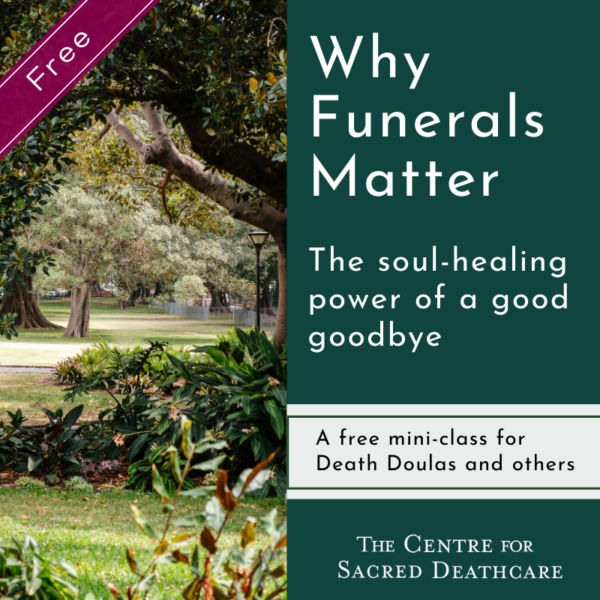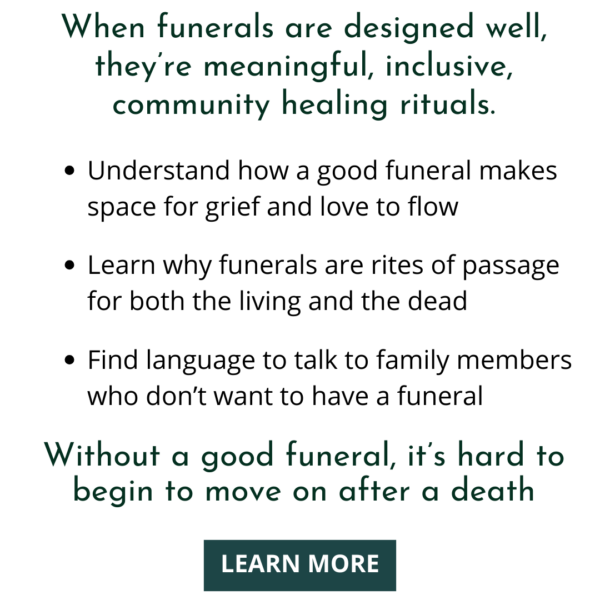
Submit your death question
This article is in response to a question from a reader. If you have your own question about death, you can submit it here. I will do my best to answer it in a future article or video.
Question: My daughter just turned 4 a few weeks ago. Last spring, we lost our cat Penny. My first pet as an adult. Her first exposure to death. I did my best to muddle through. We bought some children’s books on losing a pet and let her talk about it whenever it crossed her mind, but recently she has begun making the connection between Penny’s death in old age and humans. I don’t want her to live in fear and anxiety but I don’t want to try to hide the truth from her either. Is there anything you can suggest for parents walking very young children through this kind of processing?
–Margot
Talking to Children About Death
Hi Margot,
Thank you for writing in with this important question, and I’m very sorry to hear about Penny’s death.
I want to congratulate you on what you’ve done so far to help your daughter process her questions about mortality. Young children are naturally curious about death (whether it is the death of a pet or the concept of mortality in humans) and it’s important to hold space for these explorations.
The fact that we are all mortal, that life is not guaranteed, and that we will all die, is one of many important life lessons that our children need to learn.
Becoming curious about death is a normal developmental stage. Children may start to wonder about and ask questions like: Will I die? Will you die? Why do people die? When will I die? What happens when you die? Where do you go when you die?
Our role is to gently help children find a way to hold and be with this life experience, and to prepare them for the deaths that they will experience in their lives. We are here to teach them how to navigate loss and endings, both of the big things and the small ones. We are here to help them make sense of what death is and what it means, and to give them some of the skills and tools they need to meet it. We are here to help them find a sense of safety, and agency, even with the uncertainty that is inherent in life.
Six Principles for Meaningful Conversation
Here are six core concepts to keep in mind when talking to young kids about death:
Be Neutral
Treating death as a taboo subject teaches children that death is to be feared. Instead, we want to help kids understand that being with death is difficult, because it brings up so many difficult emotions, but it is not dangerous or something to be avoided.
In dominant culture, we aren’t taught to talk about death, and what’s unfamiliar can feel scary. We’re also not taught skills for being with difficult emotions, so it can feel scary to experience them.
Death is hard and sad. The feelings that happen around death are hard and sad. But we need to learn how to talk about all of it. When your child sees that you stay calm and open when they ask you death, they learn that it’s safe to bring other difficult or confusing feelings and concerns to you.
Young kids may also process their curiosity by play-acting a death or a funeral, or drawing a scene related to death. This is also normal, and the best thing you can do is let it be. Allow death to be just another topic that they talk about, act out, or draw, without any kind of charge around it.
Be Informative
Kids have very real questions, and they need clear, straightforward answers.
Physical Answers
Let your child know that people die when they are old, or very sick, or very badly hurt. It’s important to stress the “very” – we don’t die from being a little sick (as in catching a cold in the winter) or from being a little hurt (as in falling and scraping our knees).
Describe, in clear terms, what happens to our bodies when we die. Our hearts stop beating, our bodies stop working, we no longer eat, we no longer breathe. You can invite your child to feel their own breath going in and out, and to feel their own heart beating, to connect with the concept of what it means to be physically alive.
Explain the changes that occur in terms of feelings that your child can understand. Dead people cannot feel hot or cold. They cannot feel hungry or thirsty. They are not in pain.
You can also help your child understand death by observing it in nature. Point out dead plants, dead bugs, or dead animals, and discuss what has happened to them.
Emotional Answers
Explain to your child that death can bring up all kinds of emotions, and that it’s okay to feel those emotions.
Grieving is a skill, and it’s too much to ask anyone, especially a child, to find their way through a loss without skills and practices for integrating the grief. This is the time to help your child learn how to process big feelings, rather than pushing them away.
Model holding space for the full spectrum of your child’s emotions, as well as your own. Share your grieving practices. Do you take time in nature? Make art? See a grief counselor? Journal? Make space for big, messy and loud emotions? Help your child find the practices that will work for them.
Spiritual Answers
Children may wonder what happens to us after we die. The answer to this looks very different for every person and every family.
Share your family’s values or beliefs, and explain that there are many different possible beliefs in the world. You can start these explanations with “some people believe that…”. This will create space for your child to begin to explore their own beliefs.
If you have a sense that some part of us lives on after the body dies, but don’t understand how that works, it can be hard to find language to describe this to your child. My course The Soul’s Journey has a module called The Energetics of the Dying Process, which outlines a very child-friendly (and adult-friendly) description of what happens, at a soul level, before, during and after we die.
Be Direct
Avoid using euphemisms when talking about death and dying with children. Young children understand things in very literal and concrete ways.
It’s common for parents or others speaking to young children about death to want to “soften” their language in order for it to seem less scary. But remember, death isn’t scary when we talk about it openly and neutrally. When we explain death in a way that our kids can actually understand and conceptualize, we make room for them to process and understand it in a real way.
Euphemisms like “passed on”, “crossed over”, and “transitioned” are just more confusing for kids. Especially avoid the phrase “gone to sleep”, as this can make children fear falling asleep. Instead, be direct, and use the words “dead” and “died”.
Stress that death is permanent. Young kids don’t understand abstract concepts like “forever”, so it’s important to also explain this using very clear language. Make it clear, in terms that your child will understand, that when people die, they don’t ever come back.
Be Age Appropriate
Cater your answers to your child’s understanding level, and follow their lead. Remember that their understanding can be built over time.
Give the complete picture, but in broad, simple strokes and let the details come later as they ask more questions.
Your child may ask the same questions again and again. This is also normal. They are integrating this big, new information into their lives. Simply continue to follow the principles outlined here – stay neutral and direct, and hold space for them to learn and process.
Be Honest
Trying to “protect” your child by fudging the facts, while it comes from a place of caring, can actually create more anxiety than the truth would.
Children have vivid imaginations. If they’re not given a clear, honest explanation of what has happened to a person (or a pet) who has died, and why that has happened, they will often make up a story in order to fill in the gap.
They may start to believe that their thoughts or actions caused the death. They may start to believe that they can make the person come back.
They may become especially vigilant about behaving well in order to make up for perceived “misbehavior”. They may even behave badly in order to get punishment that they feel they “deserve”.
Simply telling kids the truth when they ask, even when it is hard, is the best way to prevent this from happening.
When they ask, explain to your kids that you will die, and they will die. And yet this is okay. Explain that we, in our families, and in our communities, are here to support each other through our grief. There are tools for grieving a loss, and we share them with each other.
Be Confident
When a young child is beginning to learn about death and loss, they are naturally going to feel unsettled. What they need to know is that they will be okay, that you have this handled, and that they will be looked after.
This doesn’t mean that you can’t cry or be sad. In fact, this is a good time to model how to be present with these normal, natural, big feelings. Teaching your child how to grieve is as important as teaching them about mortality.
The task is to hold an attitude of capable confidence. Let your child know that death is a really difficult thing, but that you and the other adults in their life know how to meet it, that you will support them, and that you will teach them the skills they need to navigate it well themselves.
I hope that you find these suggestions helpful. What you’re going through isn’t easy, but it’s important. You’re teaching your child to meet death with grace and confidence, and that’s a critical life skill.
With much love,
Sarah
Dr. Sarah Kerr, PhD
Founder, The Centre for Sacred Deathcare
www.sacreddeathcare.com
Do you have a death question?
Death is hard and sad, but it doesn’t have to be confusing or scary.
Share your emotional, logistical and spiritual questions about death, dying, grief, loss, and the afterlife. I’ll address as many as I can in articles or videos.
Many thanks for your interest in doing death better.
With much love,
Sarah


